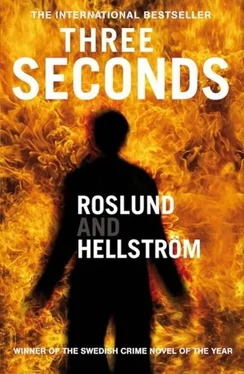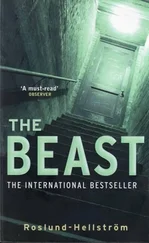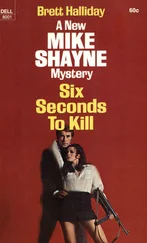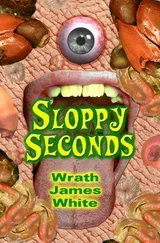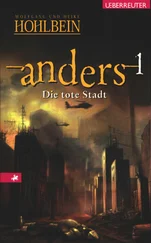It was May and the timer on the boiler would be turned off for a long time yet, so he started it manually by pressing the red button, then he opened the door and listened to it cranking into action and starting to burn. He bent down, undid his shoes and dropped them into the flames.
The three red roses would go on the middle of the kitchen table in the vase that he liked so much, the one they'd bought at the Kosta Boda glassworks one summer. Plates for Zofia, Hugo, and Rasmus in the places where they had sat every day since they left the flat the same summer. Half a kilo of defrosted ground beef from the top shelf in the fridge which he browned in the frying pan, salt and pepper, cream and two tins of chopped tomatoes. It was starting to smell good. He dipped a finger in the sauce, which tasted good too. A half-full pan of water and a bit of olive oil so that the pasta wouldn't boil over.
He went upstairs to the bedroom. The bed was still unmade and he buried his face in the pillow that smelled of her. His overnight bag was in the wardrobe, already packed: two passports; wallet with euros, zloty, and U.S. dollars; a shirt, socks, underwear, and a toilet bag. He picked it up and carried it down into the hall. The water had started to boil, half a bag of dry spaghetti into the bubbling water. He looked at the clock. Half past five. He didn't have much time, but he would make it.
It was still warm outside, the last of the sun would soon disappear behind the roof of the neighboring house. Piet Hoffmann went over to the hedge that would have to be pruned properly this summer. He saw two children he recognized on the other side and called to them that food was ready. He heard a taxi approaching down the narrow road. It pulled up and parked in the driveway by the garage. The red plastic fire engine survived once again.
"Hi."
"Hi."
They hugged each other, like they always did and every time he thought he would never let go.
"I can't eat with you. I have to go to Warsaw this evening. An emergency meeting. But I'll be home again tomorrow night. Okay?"
She shrugged.
"No, not really. I was looking forward to having the evening together. But Okay."
"I've made supper. It's on the table. I've told the boys food is ready so they're on their way. Or at least, they should be."
He kissed her quickly on the lips.
"One more. You know."
One more. Always an even number. His hand on her cheek, two more kisses.
"Now it's three. So one more."
He kissed her again. They smiled at each other. He picked up his bag and walked over to the car, looked back at the hedge and the hole at the bottom in the middle where the children would appear.
No sign of them. He wasn't surprised.
He smiled again and started the engine.

Ewert Grens looked at the mat that disappeared under the passenger seat and Sven Sundkvist. He had pushed the two cassettes in there. Two more were lurking in the glove compartment. He would take them with him sometime, pack them away, forget them.
The two young but slightly less pale uniformed police were still standing on the pavement between the hood of the car and the entrance to Västmannagatan 79. Hermansson had started to reverse when one of them came over and knocked on the window, and Sven rolled it down.
"What do you think?"
Ewert Grens leaned forward from the back seat.
"You were right. It was an execution."
It was late afternoon at Kronoberg, and finding a parking place on Bergsgatan wasn't easy. Hermansson drove round the tired police headquarters three times before parking on Kungsholmsgatan, by the entrance to Norma1m Police and the County Criminal Police, despite protests from Ewert Grens. Grens nodded vaguely at the security guard and walked in through the entrance he hadn't used for years; he had long since learned to appreciate routine and had stuck to his rigidly in order not to fall apart. One corridor and a narrow staircase and then they came out into the County Communication Center, the heart of the vast building. In a room the size of a small football field, a police officer or a staff employee sat at every second computer, watching the three small screens in front of them and the considerably larger ones that covered the walls from floor to ceiling, ready to deal with the four hundred or so emergency calls that came in every day.
Holding a cup of coffee each, they sat down next to a woman in her fifties, one of the civvies, and the sort of woman who put her hand on the arm of the person she was talking to.
"At what time?"
"Twelve thirty-seven, and a minute or so earlier."
The woman who still had her hand on Ewert's arm typed in 12:36:00, and then the silence that felt like eternity, as is often the case when several people sit together listening to nothing.
Twelve thirty-six twenty.
An automatic voice, the same one that was used in the rest of the police world, followed by the voice of a real woman who was crying as she reported a domestic at an address in Mariatorget.
Twenty thirty-seven ten.
A child screaming about a dad who'd fallen down the stairs and there was alot of blood coming from his cheek and hair.
Twelve thirty-seven fifty.
A scraping sound.
Obviously somewhere indoors. Possibly a mobile phone.
Unknown number on the screen.
"Pay-as-you-go card."
The female operator had removed her hand from Ewert Grens, so he didn't answer in order to avoid anymore physical contact. It was years since anyone had touched him and he didn't know how to relax anymore.
"Emergency services."
The scraping sound again. Then a buzzing interference. And a man's voice that was tense, stressed, but he spoke in a whisper that was trying to sound calm.
"A dead man. Vdstmannagatan 79."
Swedish. No accent. He said something more, but the buzzing sound made it difficult to hear the last sentence.
"I want to listen to it again."
The operator slid the cursor back along the time code that stretched across one of the computer screens like a black worm.
A dead man. Västmannagatan 79. Fourth floor."
That was it. The buzzing disappeared and the call was cut. The monotone electronic voice said twelve thirty-eight thirty and a distressed old man reported a robbery in a newsagent on Karlavagen. Ewert Grens thanked her for her help.
They walked together through the endless corridors of the police headquarters to the homicide unit. Sven Sundkvist slowed down to talk to his boss who limped more with each passing year, but refused to use a stick.
"The flat, Ewert. According to the owner, it was rented out a couple of years back to a Pole. I've asked Jens Klövje at Interpol to find him."
"A mule. A body. A Pole."
Ewert Grens stopped by the stairs that would take them up two stories. He looked at his colleagues.
"So, drugs, violence, Eastern Europe."
They looked at him, but he didn't say anymore and they didn't ask. They went their separate ways at the coffee machine, and with a cup in each hand he managed to open the door to his office. Out of habit he went to the bookshelf behind his desk, lifted his arm and then suddenly stopped. It was empty. Straight lines of dust, ugly squares of varying sizes: the cassette player had stood there, and all his cassettes, and there, two identical squares, the loudspeakers.
Ewert Grens ran his fingers through the traces of a lifetime.
The music he had packed away that belonged to another era would never again play in this room. He felt like he'd been tricked, tried to get used to a silence that had never existed here before.
He didn't like it. It was so damn loud.
He sat down on the chair. A mule, a body, a Pole. He had just seen a man with three big holes in his head. So, drugs, violence, Eastern Europe. He had worked for thirty-Five years in the city police force and seen crime rise steadily, get worse. In other words, organized crime. Not surprising that he sometimes chose to live in the past. That's to say, mafia. When he started out as a young policeman who had thought he could make a difference, the mafia had been something far away in southern Italy, in American cities. Today, executions like the one he had just seen, the brutality, it was all so dirty-colleagues in every district could only stand by and watch while money was laundered from all kinds of organized crime: drugs, gun running, trafficking. Every year, new players made a violent debut in police investigations, and in recent months he had been introduced to the Mexican and Egyptian mafias. This was another he had not come across before, the Polish mafia, but it had the same ingredients: drugs, money, death. They investigated a bit here and a bit there, but would never catch up; every day the police risked their lives and sanity and every day they lost a little more control.
Читать дальше
